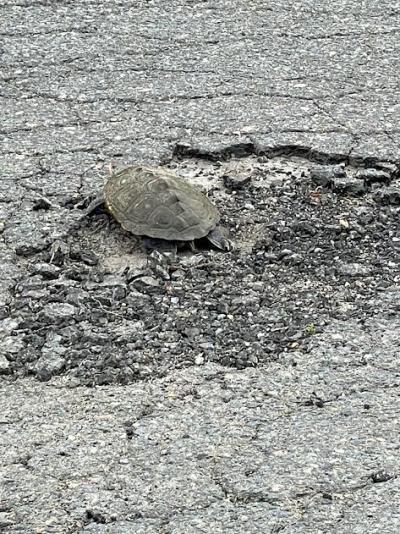Fast traffic can be fatal danger to slow-moving turtles
MARION — Wildlife officials are issuing an advisory to motorists after several diamondback terrapins, a type of turtle that is listed as a threatened species in the state, have been struck and killed by cars crossing the Weweantic Bridge, which links Marion and Wareham.
The issue is particularly problematic in the late spring and early summer, which is nesting season for the terrapins.
The situation was especially concerning on the morning of June 14, according to information provided by the New England Coastal Wildlife Alliance. On that day, three diamondback terrapins were killed by vehicles.
A fourth terrapin was rescued by Mike Maurer of Marion, who picked up the turtle and moved her across the bridge to the other side.
“That was a catastrophic day,’’ he said.
Although this was one of the worst days for turtle strikes, the situation is not unusual, he said. “This has been going on for at least 10 to 12 years,’’ he added.
Maurer crosses that bridge several times a day and has found turtles struck on several occasions.
In one case, he was able to bring a dead turtle to a wildlife rehabilitator to salvage her eggs.
The problem, he said, is that turtles are attempting to cross a road traveled by cars at significant speeds.
“It’s a main highway,’’ he said. “People cruise right along there at 50 miles an hour.’’
Turtles use the bridge because of its location, according to information provided by the New England Coastal Wildlife Alliance. Nearby turtles come ashore to nest and are funneled onto the bridge.
Their treks often intersect with mid-morning traffic, the organization reports.
Diamondback terrapins are especially vulnerable because they live long lives, reproduce slowly, and suffer from high hatchling mortality rates.
Because of this, the death of even one reproductively mature female can do lasting harm to the future of a local population, the organization reports.
The diamondback terrapin lives in brackish water, a combination of salt and fresh water, which makes the coastal marshes a prime habitat for them.
New England Coastal Wildlife Alliance representatives have said they are working with local and state authorities to increase awareness of the challenges the terrapins face on the bridge and find solutions to some of these challenges.
It’s a good time to look at this issue, Maurer said. The bridge is slated for construction in fall 2023. He says that he would like to see a tunnel built under the bridge or another step taken to keep the turtles safely off the road.
The bridge is one of a series of threats the terrapins face, according to the organization. Urban encroachment, physical structures designed to prevent erosion and rising sea levels are eroding their available nesting area on both sides and dangerous roads criss-cross their little remaining terrestrial habitat.
Females have to find a good place to lay their eggs, and they’ll go the distance to do it, even if it means putting their lives at risk with these impediments, the organization said.
Anyone who observes a turtle on or near a road is asked to call the New England Coastal Wildlife Alliance hotline at (508) 566-0099.
If the situation is safe, move the turtle off the road and in the direction it was heading. Never lift a turtle by the tail. This can injure its spine, which is fused to the top of its shell.
A major way to help turtles is to drive carefully, be aware of what’s nearby, and, the organization advised, “stay on the lookout.’’














